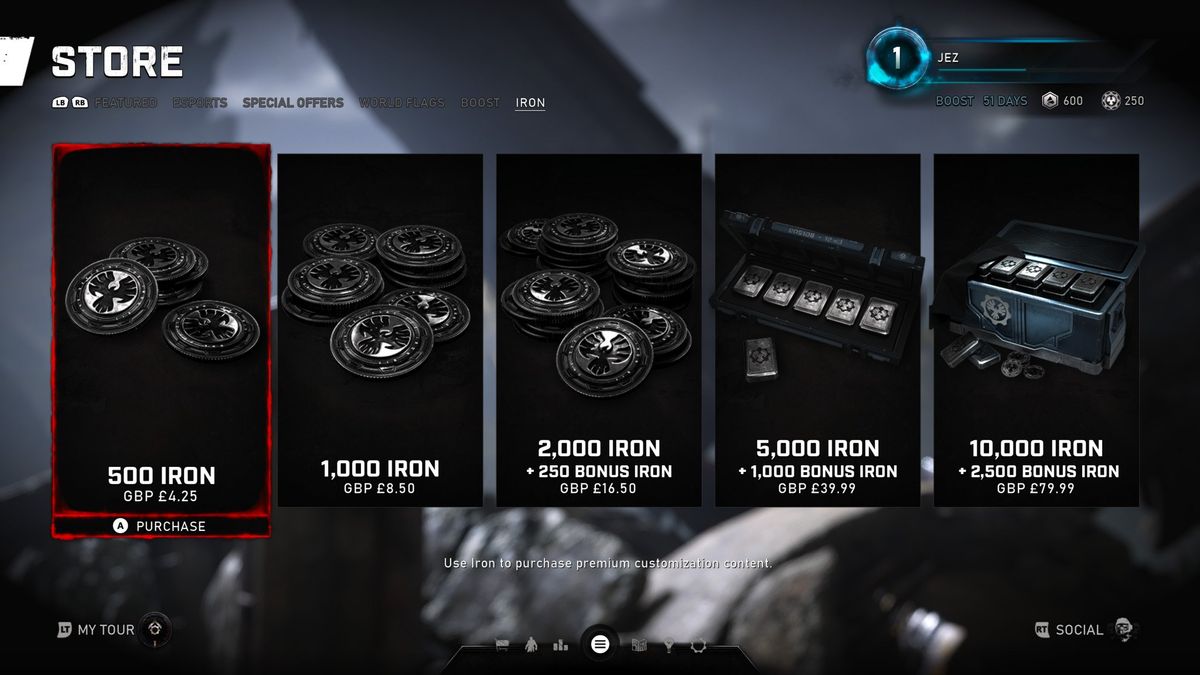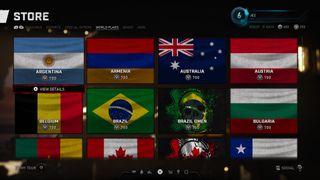Xbox's evolving micro-transaction strategy is creating friction
Loot boxes are all but dead in AAA games, it seems, but the alternatives seem to be creating an even bigger backlash.

On the Xbox 360, Microsoft set up a digital store allowing developers to create "add ons" for their games, spearheading the shift away from one-and-done packaged games and expansions to on-going, evolving services, cash flowed by high-margin microtransactions (MTX) and season passes.
Over the years, we've seen an increasingly fractious discourse emerge between publishers, developers, and gamers, over the value proposition of DLC-type content, and balancing quality and on-going updates against what amounts to manipulation, and possibly even just plain old greed.
This all came to a head with loot boxes, which, despite the industry's protests to the contrary, are literally gambling. Players would spend money for a chance at getting quality loot, with visual effects not far removed from that of a slot machine you'd find in the sleaziest Vegas Strip casinos. When EA attempted to turn these mechanics into a "pay-to-win" slot machine in Star Wars Battlefront II, that became the tipping point, where gamers effectively, collectively, decided enough was enough. The outrage was covered in the mainstream media and led to legislation against gambling mechanics in games.
Since then, loot boxes have slowly dispersed from many major AAA games. Or at least remain entirely cosmetic in their reward mechanics, which is generally regarded as at least palatable.
Sensing this backlash, Microsoft and other publishers removed similar features from their games, opting instead for cosmetic DLC that you purchase outright in exchange for on-going free updates. At least, in theory.
What is the cost of "free"?

Franchises like Gears of War and Battlefront did away with season passes for map packs, instead of committing to free maps to keep the community united in a single pool of content. To fund this, both games opted for loot boxes and other forms of micro DLC to keep the cash flowing, creating a feedback loop that would keep games growing, keep players engaged, and keep the cash rolling in. Both franchises experienced pretty furious backlashes to this model; however, since it created a tiered experience where players paying money could progress faster than those without the means (or stomach) to do so.
In the case of Star Wars Battlefront II, EA pivoted away very hard from that entire model, spending years getting the game back on track. For the most part, the community now seems relatively happy with the pace and quality of free updates, along with the amount of progression you can achieve without paying up extra cash. What was once a subreddit awash with anger, is now mainly celebrating the game.
Get the Windows Central Newsletter
All the latest news, reviews, and guides for Windows and Xbox diehards.
The same cannot be said for other major shooter franchises from EA, including Anthem and Battlefield, which have both failed to meet their previously advertised roadmaps numerous times. Battlefield V is the first in the franchise to do away with season passes, opting instead for a cosmetic MTX funding model. The map "Al Sudan" was delayed so much, it earned itself the nickname "Al Soondone."

It's hard to speculate as to why EA has struggled to maintain pace with its updates to Battlefield, or even communicate effectively. Perhaps devs were pulled over to fix up Battlefront, owing to the deal with Disney for the Star Wars license. It may also simply be a case of people are not buying the microtransactions for Battlefield V as much as EA would like, lowering the priority for those free updates. In the case of Anthem, well, the problems with that game are fairly well-documented..
These are just a couple of examples in recent memory of games-as-a-service type titles struggling to meet their roadmaps. Delays happen, but it at least feels as though games with season passes managed to achieve their content goals more consistently.
Encroaching greed?

When games like The Witcher 3 or Monster Hunter World pile on massive, high-value expansions in addition to mountains of free content updates, it creates an expectation on other publishers to do the same. Business models vary, of course, and there are numerous factors to consider from the publisher and licensing obligations, and beyond. But for the end-user, the current climate of direct-purchasing micro DLC seems to be straddling a very fine line.
Games like Call of Duty and Gears 5, in recent years, have effectively been selling tiny bits of DLC, that effectively amount to a single flat texture, for real money. Activision was selling a single red dot for a $1, for scopes. In the case of Xbox Game Studios, Gears 5 has been selling flag textures for what amounts to about $10, since you have to purchase a specific amount of virtual currency to obtain them. Sea of Thieves also recently picked up its own virtual currency, and Minecraft is about to drop a currency-oriented cosmetic character creation system.
Related: The Coalition addresses Gears 5 microtransaction concerns


A lot of this content can be earned in-game through play, however, but publishers are pushing the line. One game where this has been particularly egregious, however, is Fallout 76. Previously announced with a DLC store that would be "cosmetic only," Bethesda has been increasingly greedy with how its "cosmetic" store works, slipping gameplay-altering microtransactions into the mix. You can now purchase valuable repair kits with real money, and a refrigerator to store food for longer periods can also be purchased. Ubisoft's recent Ghost Recon: Breakpoint has also drawn a lot of negative attention for offering "time-saving" mechanics in exchange for real money, effectively helping create a system where some players gain "soft" advantages over others for spending real money. Ubisoft has since dropped them from the game.
Whether in-game rewards can be earned through play or not doesn't matter to me. Value is subjective and determined by the individual. However, when a vast majority of the incentive to progress and continue playing is tied up to these cosmetics or items, which can be "earned" with a credit card, I'd argue that it devalues the sense of progression felt by the broader player-base at large. If I have paid a premium price for a game, I shouldn't have to then pay extra to play the game "optimally." Where do we draw the line here, exactly?
The verbal contract

I'm not ignorant of the irony of this article, considering we offer free content in exchange for showing you tons of ads, but therein lies the conflict inherent of a "freemium" service model. I reckon games like Sea of Thieves, Monster Hunter World, and Minecraft offers a ton of value in exchange for offering cosmetic content on the side. Many other games don't seem to have earned their way to that, though.
Where do we draw the line here, exactly?
These issues might be symptomatic of simply not having a season pass, lowering priorities on the part of developers to deliver those free content updates in a timely fashion. But like EA found with its monetization of Star Wars Battlefront II, you can only push that "monetization" so far before it becomes frustrating. "Free" updates form the basis of a verbal contract between the community and the developers more vaguely than season passes or subscriptions did. The roadmaps seem more fluid, in a way that requires on-going communication, community maintenance, while managing perpetually shifting publisher priorities.
For developers caught in the crossfire between the expectations set by their customers and financial goals set by publishers, they're often forced to bear the brunt of the community's ire. At the end of the day, though, customers are the ones setting these prices, since they seem willing to pay up. Whether or not chasing those "high-value" paying players is worth the negative community sentiment is hard to measure.
It seems like in the near term, publishers, including Xbox, are going to continue pushing aggressively for these sorts of on-going monetization to cashflow content that keeps players engaged. At least, that is, until another company takes it too far again.
What do you think? Hit the comments, let us know.

Jez Corden is the Executive Editor at Windows Central, focusing primarily on all things Xbox and gaming. Jez is known for breaking exclusive news and analysis as relates to the Microsoft ecosystem while being powered by tea. Follow on Twitter (X) and Threads, and listen to his XB2 Podcast, all about, you guessed it, Xbox!